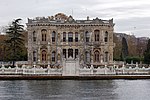Kandilli, Üsküdar
Istanbul Province geography stubsNeighbourhoods of Üsküdar

Kandilli is a neighbourhood of Üsküdar, Istanbul, Turkey. It lies on the Asian bank of Bosphorus and is home to some of Istanbul's in-city forests. The Kandilli Anatolian High School for Girls (Turkish: Kandilli Anadolu Kız Lisesi) was one of the first girl's high schools in Ottoman Turkey. The Kandilli Observatory, a facility of Boğaziçi University, is dedicated mostly to earthquake science. The Kandilli Earthquake Museum is located within the campus. The historical waterfront Vaniköy Mosque at Vaniköy, founded in honor of Vani Mehmet Efendi, an ethnic Kurdish pasha from Van, was built in 1670 during the Ottoman period. The mosque was badly damaged by fire on 15 November 2020, caused by a short circuit.
Excerpt from the Wikipedia article Kandilli, Üsküdar (License: CC BY-SA 3.0, Authors, Images).Kandilli, Üsküdar
Geographical coordinates (GPS) Address Nearby Places Show on map
Geographical coordinates (GPS)
| Latitude | Longitude |
|---|---|
| N 41.073055555556 ° | E 29.057777777778 ° |
Address
34684
Türkiye
Open on Google Maps





